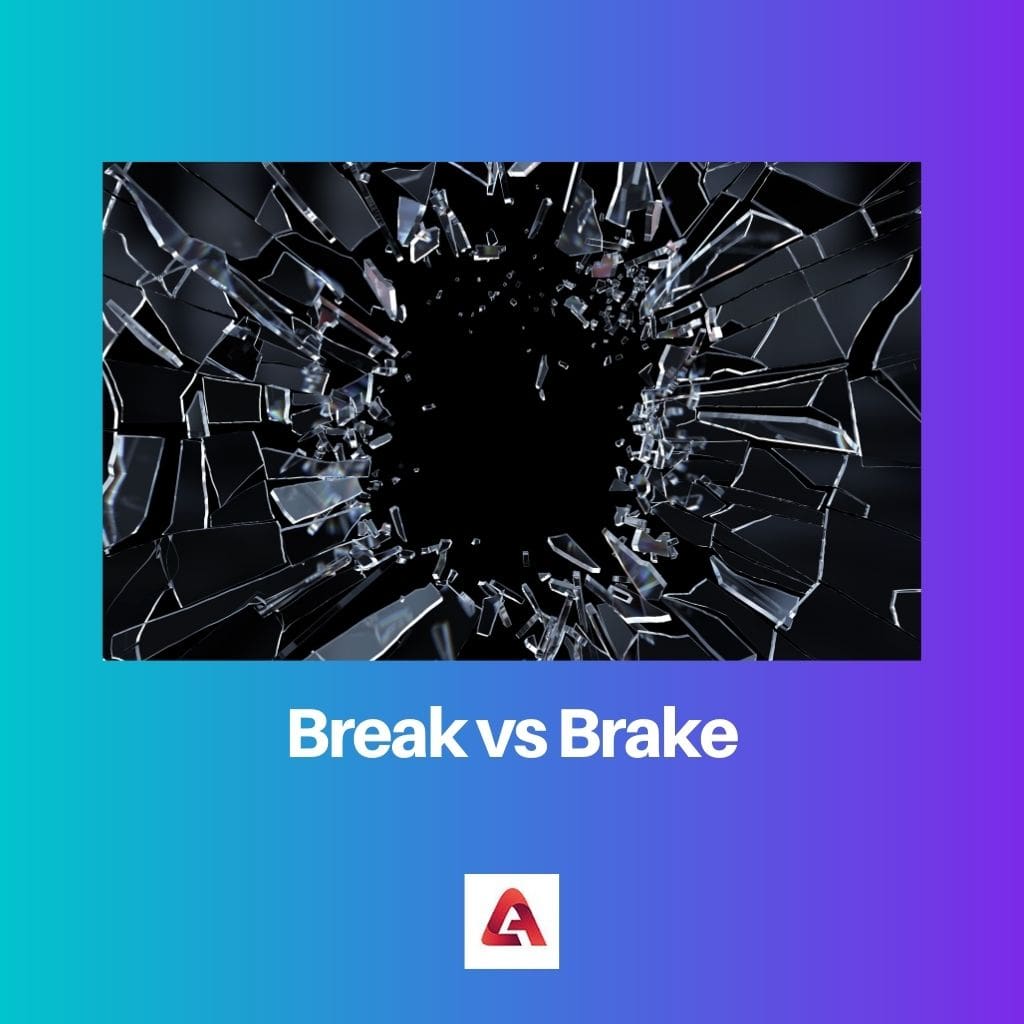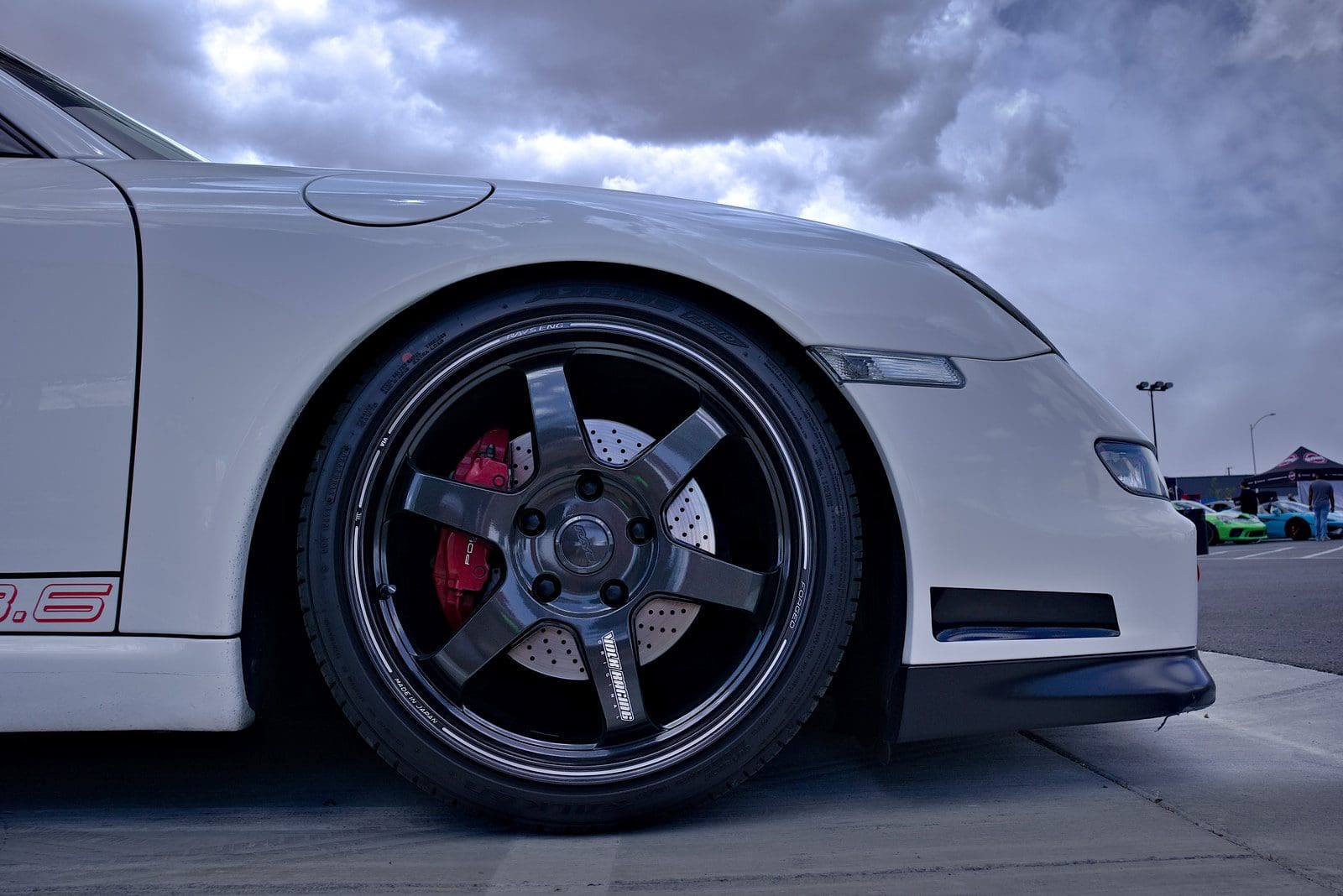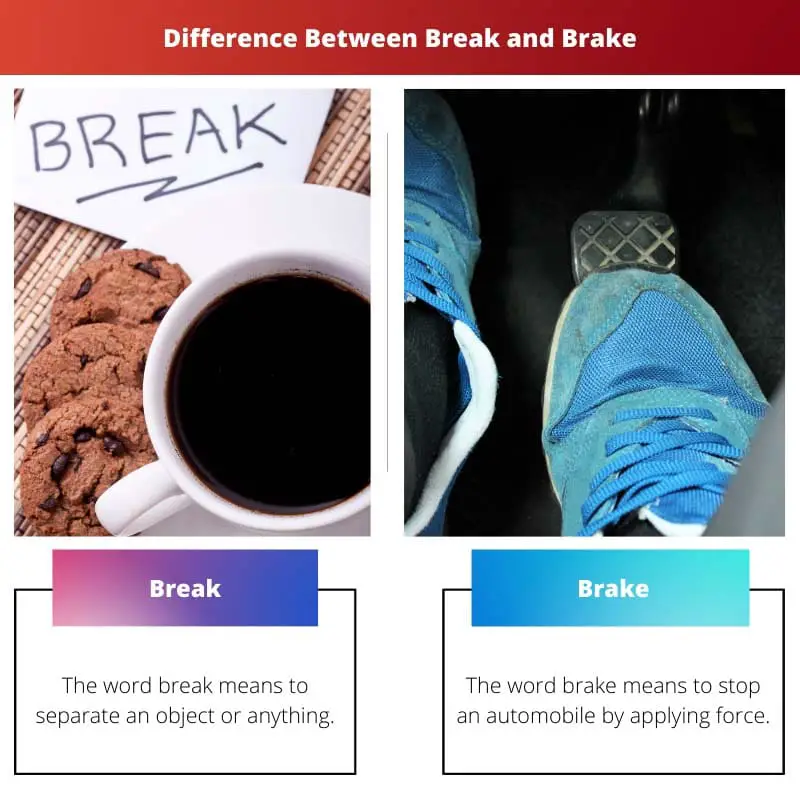In any language, homophones are always used. Most of them will be used in poetry to have a rhyme scheme. Homophones are words that have similar sounds but different meanings.
They will also have different spellings. Generally, people tend to confuse the spellings. It blurs the people’s minds on which word they should use; another, they convey what they want to convey without affecting the meaning.
There are many homophones to affect the writer’s choice of use. A proper understanding of the spelling and meaning is a must for all. There are many homophones in use.
Brake is one of the homophones that many people go wrong while using in a sentence.
Key Takeaways
- “Break” is a verb meaning to separate into pieces, interrupt a continuous action, or violate a rule or agreement.
- “Brake” is a noun referring to a device used to slow down or stop a vehicle, or a verb meaning from applying the brakes to slow down or stop.
- Understanding the difference between “break” and “brake” is important for clear communication and correct usage in writing and speech.
Break vs Brake
Break means to cause something to separate into pieces, either by violently hitting it or dropping it. A brake is a mechanical device that inhibits motion by absorbing energy from a moving system. It is used to reduce a moving vehicle’s speed or stop it by pressing it.

Comparison Table
| Parameters of Comparison | Break | Brake |
|---|---|---|
| Meaning | The word break means to separate an object or anything. | The word brake means to stop an automobile by applying force. It s a piece of mechanical equipment which is used for the same. |
| Type of verb | The break is an irregular verb. | Brake is a regular verb. |
| Parts of speech | It can be used as a verb as well as a noun. | It can be used only as a noun. |
| Verb form | A break can be used as a transitive and intransitive verb form. | The break can be used only in one form of a verb. |
| Example | Be careful while handling the glass because there is a chance for you to break it. | She applied a sudden brake as she didn’t notice the traffic lights. |
What is Break?
The words break got many meanings. The word with the exact spelling and pronunciation would differ in its meaning according to the context in which it is used.
- When used in general, the meaning that flashes into the mind crush something into pieces.
Example: The thief tried to break the lock to enter the bank.
- Legally the word is used when someone tries to violate the rules
Example: If you break the rules, you will be caught by the police.
- The word ‘break’ also means that some vital information has been made to be known publicly.
Example: David left for Paris when the news broke.
- It also means shattering a person’s confidence or losing self-confidence.
Example: She completely broke down when she learned the truth about him.
- To take rest from the work that is being done to get refreshed
Example: I want to take a short break after washing the car.
- It also means putting an end to the relationship between people.
Example: Hearing the news that Jen and Eric broke up is sad.
- It also means the dawn of the day/ the beginning of the day.
Example: She left the house as soon as the day broke.
There are similar other meanings for the word break. Hence it can be used as a verb or as a noun. The meaning changes itself according to the situation.

What is Brake?
The part of speech of a brake is a noun. It is not used as a verb in its usage. So it has all the rules that would apply to the nouns.
The brake is a mechanical device that is used to bring a machine to a halt. This can be achieved through the application of friction. The primary use of brake is to stop the motion of an automobile.
Hence brakes can be used to convert one form of energy into another form of energy.
A regenerative brake will convert the energy into electrical energy. It also stores the energy to use later. Most of the brakes are used in any rotating mechanism. Hence they are used in an axle or a wheel.
There could be no automobile or machine that can be manufactured without the brake. In earlier times, people used to apply energy manually.
It required a lot of mechanical energy. With the advent of automobiles, the brake was done by fuel energy.
The three basic principles on which the brakes work are frictional, electromagnetic and pump. Based on these principles, the brakes are classified into frictional, pump, and electromagnetic.
Sometimes the brakes become a source of noise pollution.
This is because some energy is converted into acoustic—external factors such as the road’s surface and tire. The maintenance of the brake is essential for every vehicle to stay safe.
The loss of function of the brake may lead to fatal accidents. So great care should be taken of the brakes of automobiles, or anywhere the brakes are applied.

Main Differences Between Break and Brake
- The Brake is a physical component, but a break can not be seen.
- The word break means to pause for a minimum time. But the break can mean putting something to an end.
- The word break deals with an action of rest, whereas the word brake means the mechanism in a vehicle
- The phrasal verb formed by using break extensively impacts its meaning. There could be no phrasal verb formed using the brake.
- The brake could bring to a permanent stop, but a break would get only a short-term halt.


This article could benefit from a more engaging tone. The content is valuable, but I found the delivery to be dry and mundane.
The section explaining the functionality of ‘brake’ and its historical context was enlightening. It’s fascinating to learn about the origins of such integral components in machines.
The examples provided for both ‘break’ and ‘brake’ usage are illuminating. I believe this article will help many individuals improve their written and verbal communication.
I always struggled with the use of these homophones. After reading this article, I have gained a better understanding of when to use ‘break’ and ‘brake’. Thank you for sharing.
This article is very informative and well-structured. I appreciate how you elaborated on the nuances of both ‘break’ and ‘brake’.
I never realized the intricacies of ‘break’ and ‘brake’ until I came across this article. I’m grateful for the insight it offered.
The explanations of ‘break’ in various contexts were intriguing. I didn’t know the word had so many connotations.
I found the comparison table included in this article to be extremely helpful. It made it easier to differentiate between ‘break’ and ‘brake’.
While I understand the importance of this information, the article seemed too lengthy and did not capture my attention throughout.
Thank you for explaining the differences in meanings and usage of ‘break’ and ‘brake’ in such a detailed manner. It is vital to have a clear understanding of these homophones to avoid confusion when writing or speaking.